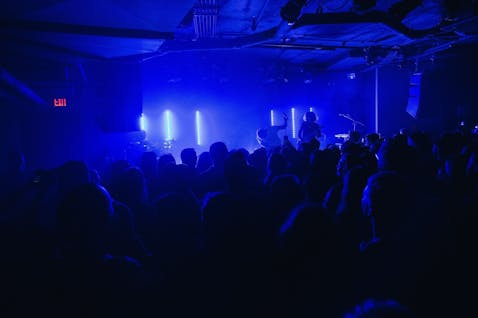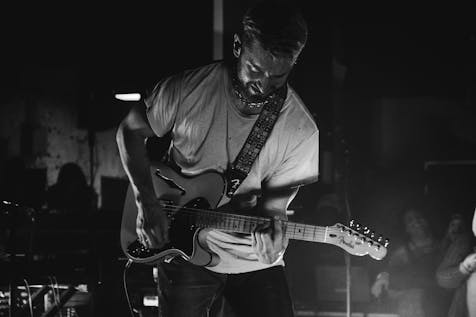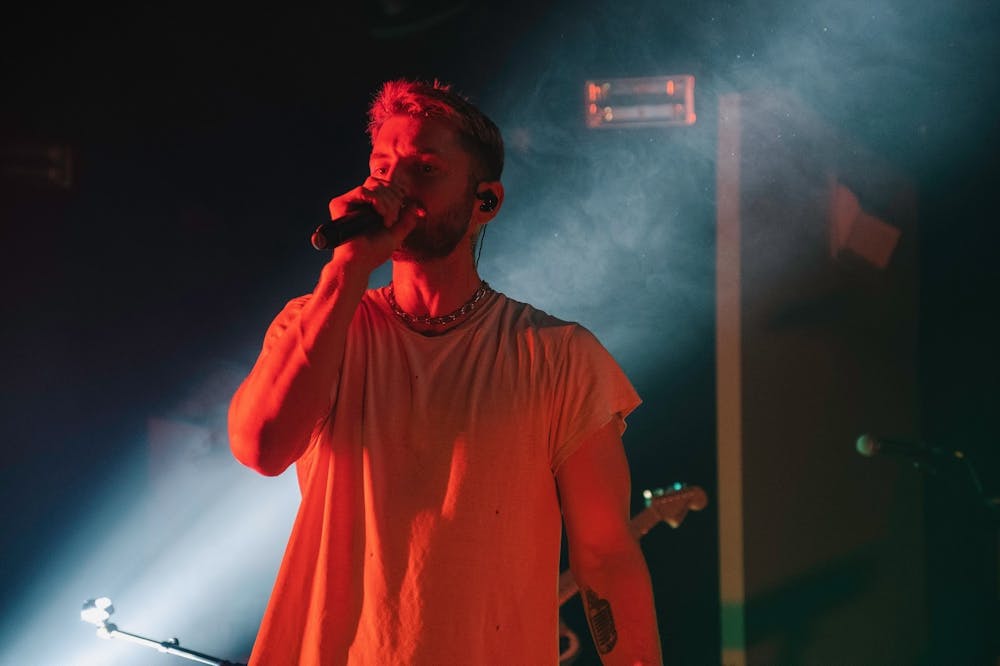Whether you’ve heard him on your Spotify’s Discover Weekly or saw him perform live in concert, Marc E. Bassy is taking the music industry by storm. After the up-and-coming artist released his latest album, “PMD,” in September of 2019, his monthly listeners have continued to rise in numbers.
Bassy has been in tune with his musical talents since he was young and decided to pursue a career doing what he loved, taking time to craft his writing and music.
Bassy started out a member of the L.A.-based band 2 A.M. Club before pursuing his own venture in music. He performed at U Street Music Hall on Feb. 18, exhibiting his ability to naturally entertain the crowd. He currently has 4 million Spotify listeners and has come a long way from the start of his career.
Bassy has expanded away from the “tragically hip cool people music” that he connected with in his early 20s. He feels like he has now been able to write his lyrics with a good blend of genres. Having been gifted with writing and catching melodies at a young age, Bassy believes that his true calling is with his music.
Here’s what Bassy had to say as he plots his next decade of music.

Devika Knafo: Your music is a combination of hip hop, smooth R&B and heartfelt lyrics. Your album “PMD” is an ode to this generation's lack of connection. You mentioned that “we live in a world where everyone is more connected than ever but feels more lonely than ever.” How have you been able to explore this idea, and what have you been able to find?
Marc E. Bassy: I think that the more I explore it and think about it, it’s not just about people being more alone than ever, it’s about people not feeling comfortable being alone because they feel like they are supposed to be plugged into something at all times. I saw that when it came to having limitations on things, I could see things in life getting shorter. This behavior we have is addictive, suppressing mankind’s curiosity, and we find ourselves in this cycle of repetition that is never-ending.
DK: Have you felt a personal disconnect with the world because of the changes happening in society with the way people act and behave around each other? What things have you learned about life and the human condition that has shaped your music and its purpose?
MEB: I used to be more idealistic, like everyone around us. I used to think of music as something revolutionary. I saw music as something that existed in a way that was subtle and not on purpose. I’ve learned that it’s more about how you say something, rather than what you say. And no one wants to hear someone barking at them or preaching at them. We want to hear someone turning into a master of their craft - that’s what is inspiring. And things that are trying to be something without naturally carrying that energy just go out of style and don’t live on, and I want my music to live on. When I first started touring, it started as something where I wanted attention and to be desirable, and there was this ego trip stuff that came with it all.
I felt like there were many people who weren’t doing things because they kept telling themselves that they can’t, and it never occurred to me that I couldn’t. I always thought I wanted to be in the NBA, but then I had a personal trauma and a near-death experience when I was 17, and I had to spend time in the hospital. The second I walked out and recovered, I told myself I can do anything, so why wouldn’t I do something I like? I loved what I was doing with music at the time, so I figured, why not take this seriously? I didn’t really know how to do what I was doing, but I wanted it so bad because it was so much fun. I loved playing with that energy that came with creating a song. I never did anything creative before music - I was just an athlete, so it was new to me. I was so behind, but so confident for how bad it was. I was all in and it's taken me 10 years to perfect my craft.

DK: What is the purpose behind your music? What emotions do you want to stir up in people who listen to your music? What do you want people to feel? Additionally, how have you expressed vulnerability?
MEB: I want people to not be afraid to be themselves. I want people to listen to my music and be like “I can be myself too, publicly with no shame.” Once I get on the record, that's my time to say what I want, to be what I want and I don't have to be afraid or pretend. If I feel like taking a chance and being someone else, I can do that. I can do anything I want. I want people to be inspired by what they do and be who they are - you are creating an identity for yourself, so find that freedom for yourself.
DK: How do you feel the Internet has impacted the music business?
MEB: I think that America is changing, people’s standards are changing [and] people's interests are changing. There are a lot more opportunities for entertainment. I feel like California is the only place where your social life is completely linked to your professional life. It doesn’t matter how hard you work at your craft, it depends on who you know and how many followers you have. I appreciate the industry and wouldn’t want to have it any other way. But this lifestyle in California has influenced many themes for my albums in the past and also “PMD.” Until I leave L.A., the theme of my music is gonna be L.A. That’s the theme. Every album has been about the things that come with L.A.: the sex, drugs, expectations, the social media craze. I’m still a mystery to myself, and that’s a mystery to me.





